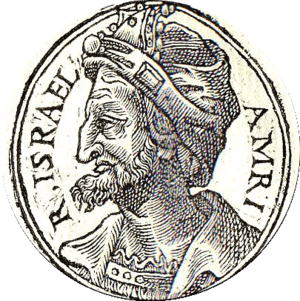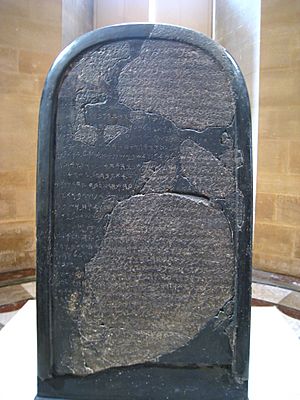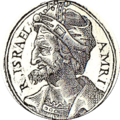Omri facts for kids
Quick facts for kids Omri |
|
|---|---|

Omri from Guillaume Rouillé's Promptuarii Iconum Insigniorum
|
|
| King of Northern Israel | |
| Reign | 884 BCE – 873 BCE |
| Predecessor | Tibni |
| Successor | Ahab |
| Issue | Ahab Athaliah Nimshi? |
| House | House of Omri |
Omri was a powerful king of ancient Israel. He ruled the northern part of the kingdom. He was a skilled military leader who made his kingdom stronger and larger. Omri is famous for building the city of Samaria, which became his new capital.
The Bible mentions Omri as the sixth king of Israel. It also says he did things that were considered wrong by its standards. Besides the Bible, other ancient writings also talk about Omri. These writings show how important he was in his time.
Contents
Becoming King
Omri started as a top army commander for King Elah. Another commander, Zimri, killed King Elah and took the throne. But Zimri's rule lasted only seven days.
Omri's soldiers chose him to be their new king. He led them to attack Tirzah, where Zimri was. Zimri died during the attack. After this, some people supported another leader named Tibni. It took Omri four years to finally defeat Tibni. Once Tibni was gone, Omri became the undisputed king of Israel.
Building Samaria
The old capital, Tirzah, had been damaged during the fighting. Its royal palace was even burned down. Omri decided to find a new place for his capital city. He bought a hill from a man named Shemer. This hill was in a good location.
Omri then built a brand new city on this hill. He named it Samaria. Samaria became the new, strong capital of the kingdom of Israel. Omri ruled from Samaria until he died and was buried there. His son, Ahab, became king after him.
Omri's Family: The Omrides
Omri started an important royal family, or dynasty, known as the House of Omri. This family ruled Israel for a long time. Kings like Ahab, Ahaziah, and Joram were part of this family. Athaliah, a queen, was also from this line.
Omri's rule brought a period of peace with the southern Kingdom of Judah. The two kingdoms even worked together. They also made alliances with nearby Sidon through royal marriages. This peace helped Israel grow stronger and richer.
However, these alliances also brought new challenges. For example, religious ideas from Phoenicia came into Israel. This led to disagreements between traditional beliefs and the new ways. The prophet Elijah was a strong voice for traditional ways.
During this time, powerful empires like Assyria were growing. Assyria began to expand towards Israel. This led to battles, like the Battle of Qarqar where King Ahab fought against the Assyrians. These wars eventually led to the destruction of the Kingdom of Israel much later.
Even after Omri's death, his family was so famous that other kingdoms, like Assyria, kept calling Israel the "House of Omri." This shows how important Omri was in ancient history.
Ancient Discoveries About Omri
Historians and archaeologists have found ancient writings that mention Omri. These writings help us learn more about his reign.
- The Mesha Stele: This is a stone monument found in Moab. It talks about Omri expanding his kingdom into Moab. It calls him "Omri King of Israel." This shows that Omri was a well-known ruler in the region.
- The Black Obelisk of Shalmaneser III: This ancient stone monument from Assyria also mentions Omri's family. It shows Jehu, a later king of Israel, bowing down to the Assyrian king. The inscription calls Jehu "son of Omri," even though he wasn't Omri's direct son. This means the Assyrians used "House of Omri" to refer to the entire kingdom of Israel.
These discoveries from outside the Bible help us confirm that Omri was a real and important historical figure.
Images for kids
-
In a scene from the Black Obelisk Jehu, designated mIa-ú-a mar mHu-um-ri-i (Jehu of the land of people of Omri) bows before Shalmaneser III.
See also
 In Spanish: Omrí para niños
In Spanish: Omrí para niños
- History of ancient Israel and Judah
- List of biblical figures identified in extra-biblical sources
 | Aaron Henry |
 | T. R. M. Howard |
 | Jesse Jackson |





